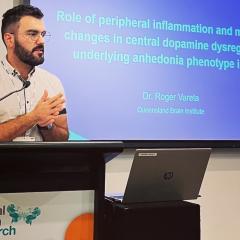Research Areas
- Deep Brain Stimulation
- Neuromodulation
- Depression
- Bipolar disorder
- Stress disorders
- Parkinson’s Disease
- Biomarkers
- Refractory psychiatric illness
Current projects
- Understanding the pathophysiological mechanisms of treatment resistance, particularly the role of stress, inflammation, and metabolic dysfunction;
- Defining the therapeutic mechanisms of novel pharmaceutical agents and brain stimulation technologies with the ultimately goal of identifying specific biomarkers of treatment response;
- Establishing translational behavioural paradigms that can be effectively used across species (rodent to human) to quantify specific neural correlates of disease pathophysiology and treatment response;
- Developing novel technologies for brain stimulation;
- Translating novel treatment approaches and neuromodulation technologies to the clinic.
Latest news
-
-
A Grey Matter: New season, new conversations in 2025
3 October 2025











